Posted on April 2nd, 2012 by Mary Lord
 Engineering researchers who toil in the field of sanitation, especially sanitation for the world’s poorest citizens, used to find that their field carried about as much cachet as a fly-ridden latrine. Not anymore. In July, 2011, the Bill & Melinda Gates Foundation announced eight grants totaling $3 million for university engineering projects to “Reinvent the Toilet.”
Engineering researchers who toil in the field of sanitation, especially sanitation for the world’s poorest citizens, used to find that their field carried about as much cachet as a fly-ridden latrine. Not anymore. In July, 2011, the Bill & Melinda Gates Foundation announced eight grants totaling $3 million for university engineering projects to “Reinvent the Toilet.”
Read More
Filed under: Special Features | Comments Off on Feature: Bill Gates Wants to Reinvent Toilets
Tags: Clean Water, Grand Challenges, Waste management, Water, Water management
Posted on November 27th, 2011 by Jaimie Schock
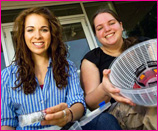 In many poor, rural areas of the world, scourges like malaria, HIV/AIDS, and malnutrition are endemic. Blood tests for anemia are a quick way to diagnose them, but it can take days to get results back from hospitals many miles away. Last year, a multidisciplinary team of Rice University undergraduates devised a clever solution: It’s a centrifuge fashioned from a common salad spinner.
In many poor, rural areas of the world, scourges like malaria, HIV/AIDS, and malnutrition are endemic. Blood tests for anemia are a quick way to diagnose them, but it can take days to get results back from hospitals many miles away. Last year, a multidisciplinary team of Rice University undergraduates devised a clever solution: It’s a centrifuge fashioned from a common salad spinner.
Read More
Filed under: Special Features | Comments Off on Feature: Low Cost, High Impact
Tags: Clean Water, Disease, Engineers Without Borders, Health, Healthcare, University outreach, Water management
Posted on October 11th, 2010 by ASEE
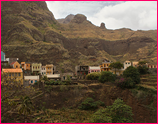 In this lesson from the Peace Corps, students in grades 4-12 learn how harvesting water from fog can help people who have limited access to fresh water. They study the water challenges in Cape Verde, and the technology and benefits of fog water collectors. They then build and evaluate a own working model.
In this lesson from the Peace Corps, students in grades 4-12 learn how harvesting water from fog can help people who have limited access to fresh water. They study the water challenges in Cape Verde, and the technology and benefits of fog water collectors. They then build and evaluate a own working model.
Read More
Filed under: Grades 6-8, Grades 9-12, Grades K-5, Lesson Plans | 1 Comment »
Tags: Clean Water, Environmental Engineering, Grades 4-12, Peace Corps Cape Verde, Water
Posted on October 11th, 2010 by ASEE
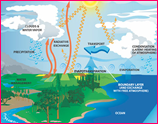 In this lesson from the Peace Corps, students in grades 3-8 learn how to generate fresh water from seawater, using the power of the sun. They study the water challenges in Cape Verde and the advantages of distilling water through a simple solar sill. They then build and evaluate a working model.
In this lesson from the Peace Corps, students in grades 3-8 learn how to generate fresh water from seawater, using the power of the sun. They study the water challenges in Cape Verde and the advantages of distilling water through a simple solar sill. They then build and evaluate a working model.
Read More
Filed under: Grades 6-8, Grades K-5, Lesson Plans | 1 Comment »
Tags: Clean Water, Environmental Engineering, Peace Corps Cape Verde, Water management
Posted on June 7th, 2010 by Jaimie Schock
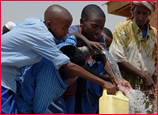 Three rivers run through Pittsburgh, so it is blessed with an abundance of potable water. But 3 billion people across the globe, nearly half the world’s population, don’t have ready access to fresh water. That was the lesson driven home to 550 high school students at a recent daylong tutorial sponsored by the World Affairs Council of Pittsburgh.
Three rivers run through Pittsburgh, so it is blessed with an abundance of potable water. But 3 billion people across the globe, nearly half the world’s population, don’t have ready access to fresh water. That was the lesson driven home to 550 high school students at a recent daylong tutorial sponsored by the World Affairs Council of Pittsburgh.
Read More
Filed under: K-12 Education News | Comments Off on Students Converge to Talk Water
Tags: Clean Water, Public Policy, Water, Water management, Water Resources
Posted on April 19th, 2010 by ASEE
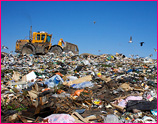 What happens to garbage? In this lesson, students grades 9-12 derive the answer by building their own landfill. While observing how household waste can leach into soil and groundwater, they also learn the importance of well supervised, sanitary disposal sites.
What happens to garbage? In this lesson, students grades 9-12 derive the answer by building their own landfill. While observing how household waste can leach into soil and groundwater, they also learn the importance of well supervised, sanitary disposal sites.
Read More
Filed under: Grades 9-12, Lesson Plans | 2 Comments »
Tags: Clean Water, Environmental Engineering, Environmental Protection Agency, Environmental science, Grades 9-12, Lesson Plan, Waste management
Posted on April 19th, 2010 by ASEE
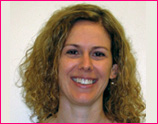 Students have to grapple with real-world applications of environmental engineering, Prof. Jeanine Plummer of Worcester Polytechnic Institute believes: “They need to see how it applies, why it’s important — ‘why am I here’ sort of questions.” An article from ASEE’s Prism magazine.
Students have to grapple with real-world applications of environmental engineering, Prof. Jeanine Plummer of Worcester Polytechnic Institute believes: “They need to see how it applies, why it’s important — ‘why am I here’ sort of questions.” An article from ASEE’s Prism magazine.
Read More
Filed under: Special Features | Comments Off on Feature: Open Door, Open Heart
Tags: Clean Water, Environmental Engineering, Water management
Posted on April 19th, 2010 by ASEE
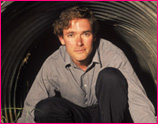
First, Marc Edwards discovered high levels of lead in Washington D.C.’s drinking water, then he had to persuade the bureaucracy to get the word out — an article from ASEE’s Prism magazine, by Pierre Holme-Douglas
Read More
Filed under: Special Features | Comments Off on Engineer Profile: Marc Edwards
Tags: Clean Water, Environmental Engineering, Water management
Posted on January 4th, 2010 by ASEE
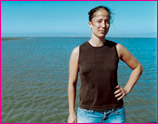
Environmental engineer Alexandria Boehm teaches environmental law and science policy at Stanford University Law School, exploring topics like beach pollution and disappearing wetlands. She also travels the world to aid coast communities, and recently spent three months studying polluted drinking water in Dar es Salaam, Tanzania.
Read More
Filed under: Special Features | Comments Off on Feature: Earth Day, Every Day
Tags: Beach pollution, Clean Water, Ocean, Stanford University
 Engineering researchers who toil in the field of sanitation, especially sanitation for the world’s poorest citizens, used to find that their field carried about as much cachet as a fly-ridden latrine. Not anymore. In July, 2011, the Bill & Melinda Gates Foundation announced eight grants totaling $3 million for university engineering projects to “Reinvent the Toilet.”
Engineering researchers who toil in the field of sanitation, especially sanitation for the world’s poorest citizens, used to find that their field carried about as much cachet as a fly-ridden latrine. Not anymore. In July, 2011, the Bill & Melinda Gates Foundation announced eight grants totaling $3 million for university engineering projects to “Reinvent the Toilet.”









 In this lesson from the Peace Corps, students in grades 4-12 learn how harvesting water from fog can help people who have limited access to fresh water. They study the water challenges in Cape Verde, and the technology and benefits of fog water collectors. They then build and evaluate a own working model.
In this lesson from the Peace Corps, students in grades 4-12 learn how harvesting water from fog can help people who have limited access to fresh water. They study the water challenges in Cape Verde, and the technology and benefits of fog water collectors. They then build and evaluate a own working model. In this lesson from the Peace Corps, students in grades 3-8 learn how to generate fresh water from seawater, using the power of the sun. They study the water challenges in Cape Verde and the advantages of distilling water through a simple solar sill. They then build and evaluate a working model.
In this lesson from the Peace Corps, students in grades 3-8 learn how to generate fresh water from seawater, using the power of the sun. They study the water challenges in Cape Verde and the advantages of distilling water through a simple solar sill. They then build and evaluate a working model. Three rivers run through Pittsburgh, so it is blessed with an abundance of potable water. But 3 billion people across the globe, nearly half the world’s population, don’t have ready access to fresh water. That was the lesson driven home to 550 high school students at a recent daylong tutorial sponsored by the World Affairs Council of Pittsburgh.
Three rivers run through Pittsburgh, so it is blessed with an abundance of potable water. But 3 billion people across the globe, nearly half the world’s population, don’t have ready access to fresh water. That was the lesson driven home to 550 high school students at a recent daylong tutorial sponsored by the World Affairs Council of Pittsburgh. What happens to garbage? In this lesson, students grades 9-12 derive the answer by building their own landfill. While observing how household waste can leach into soil and groundwater, they also learn the importance of well supervised, sanitary disposal sites.
What happens to garbage? In this lesson, students grades 9-12 derive the answer by building their own landfill. While observing how household waste can leach into soil and groundwater, they also learn the importance of well supervised, sanitary disposal sites. Students have to grapple with real-world applications of environmental engineering, Prof. Jeanine Plummer of Worcester Polytechnic Institute believes: “They need to see how it applies, why it’s important — ‘why am I here’ sort of questions.” An article from ASEE’s Prism magazine.
Students have to grapple with real-world applications of environmental engineering, Prof. Jeanine Plummer of Worcester Polytechnic Institute believes: “They need to see how it applies, why it’s important — ‘why am I here’ sort of questions.” An article from ASEE’s Prism magazine.
